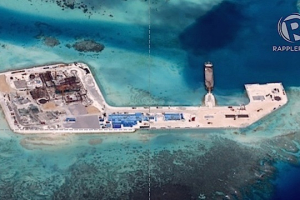Philippine and Vietnamese sent a strong signal to China as they played football, tug-of-war, volleyball, sack race and centipede race Wednesday at the Philippine-held Northeast Cay island (Parola Island) amidst simmering tension in the West Philippine Sea (South China Sea) following China's rapid island-building activities.
Philippine Navy spokesman Col. Edgard Arevalo said the event was to reciprocate a similar event held in June last year at the Vietnamese-occupied Southwest Cay about 4 kilometers (2.5 miles) from Northeast Cay island, reported the Philippine Star.
He said officials of both navies exchanged "symbolic handshakes." Around 100 Philippine Navy troops and 60 Vietnamese navy personnel participated in the games.
Arevalo commented on the activity, "Interpersonal interactions like this intend to bring about camaraderie and understanding. It intends to enhance cordial relations while engaging opponent teams through sports events."
The Philippine Navy official clarified that the games "does not intend to pick on China," and added they were planned with peaceful intent and to show solidarity.
The Philippines and Vietnam are technically rivals as both countries have overlapping claims in several islands, shoals and islets in the Spratly Group of Islands. The two sides have recently agreed to cooperate to ease tensions in the disputed waters. The two countries have been involved separately in dangerous standoffs with China.
Vietnamese forces seized the Southwest Cay island (called Pugad) by the Philippines in the 1970s. Prior to that, Philippine soldiers used to occupy the said island.
China's massive reclamation activities and its aggressive assertion to its claim over 80 percent of the West Philippine Sea (South China Sea) have stoked tension in the region. The Philippines, Vietnam, Malaysia, Taiwan and Brunei also have overlapping claims in Spratlys. An estimated $5 trillion in ship-borne trade passes through the West Philippine Sea every year.
In Hawaii, U.S. Defense Secretary Ashton Carter told his Philippine counterpart Voltaire Gazmin that Washington's commitment to defend Manila remains "ironclad" as he reiterated calls for China to stop its reclamation activities in the disputed waters and help bring down tension.
Carter and Gazmin met in Hawaii to discuss the tension in the disputed waters. Carter and Gazmin issued a joint statement and said that both countries "agreed that all parties involved in the South China Sea should seek a peaceful resolution of disputes, immediately halt land reclamation, and stop further militarization of disputed features,"
Earlier, Manila said it would continue its patrol missions over the disputed areas despite warnings from Beijing. Washington also said it would ignore China's challenges to its aircrafts and ships over the disputed waters.
Last week, the Chinese military ordered a US Navy P-8 Poseidon surveillance plane to leave an area above the disputed Spratly islands in the West Philippine Sea. The American aircraft ignored the demand and insisted it was flying in international airspace.
The U.S. has repeatedly asked China to help defuse the tension in the disputed waters and asked the People's Liberation Army to "to use its military capabilities in a manner that is conducive to maintaining peace and stability in the Asia-Pacific region."
In an editorial, the unofficial Global Times warned that "war is inevitable" with the U.S. if it refuses to stay out of the South China Sea and accepts its expansion. "If the United States' bottom line is that China has to halt its activities, then a US-China war is inevitable in the South China Sea", the Global Times said, which is often seen as a mouth-piece of the communist regime.

















